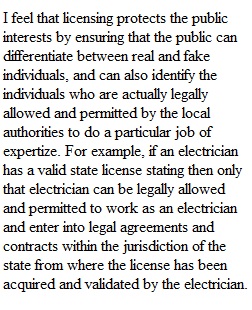


Q Legality generally concerns issues in which you can't have an agreement to do something illegal, or perhaps against public policy (yes, this is a vague term and not published.) How does licensing protect the public's interest? Ex. The license to practice a profession such as medicine, law, dentistry. Try this scenario: Ray Max gives me a call and asks me if I know of a candidate-buyer of the vacant house next door to my house. I informed my brother-in-law of the house and 'sold' him on purchasing the contract. Brother-in-law calls Max and purchases the house. Commission pays 1.5% of the purchase price of $300,000, or $4500. Max says he cannot pay me the commission as I do not have a 'license' to sell real estate. Is he correct? Can you assert a valid legal claim, in 'equity'(recall equity comes in to correct a bargain passing for free, and as we know, "...there's no free lunch!" in this world.)
View Related Questions